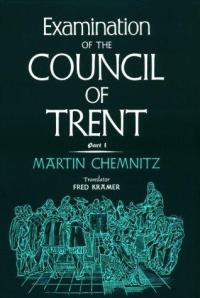
About a week ago, Matthew Block, the editor of the Canadian Lutheran (published by the more confessional Lutheran Church or Canada), had a very nice piece that was published at the First Thing’s “First Thoughts” blog titled “Are Lutherans Catholic?: Looking for a Protestant Future? Try the Protestant Past.” (for more on what Matthew Block is responding to, read the first two paragraphs of this piece I did)
Here is a sizeable excerpt from the end of the piece, which I recommend reading in full:
…To be catholic, then, is to be heirs of the apostolic faith. It is to be rooted firmly in the Apostle’s teaching as recorded for us in Scripture, the unchanging Word of God. But while this Word is unchanging, it does not follow that it is static. The history of the Church in the world is the history of Christians meditating upon Scripture. We must look to this history as our own guide in understanding Scripture. To be sure, the Church’s tradition of interpretation has erred from time to time—we find, for example, that the Fathers and Councils sometimes disagree with one another—but it is dangerous to discount those interpretations of Scripture which have been held unanimously from the very beginning of the Church.
This tradition of meditation, of course, cannot invent new dogma—it is “not a source of dogma qua dogma,” as Hearth R. Curtis explains well in a 2005 Lutheran Forum article entitled “The Relation between the Biblical and Catholic Principles.” But it is nevertheless, “the source of apostolic interpretation which norms our interpretation of the apostolic Scriptures.” In other words, Scripture is the sole source of dogma for the Church, but the Church’s tradition of meditation “establishes how that source is to be interpreted.” It is in this sense that the three ecumenical creeds are understood to be authoritative: not because they invented new doctrine (they didn’t), but because they carefully codified truths already present in the Scriptures.
In this way the Church’s tradition of meditation guides us into a proper understanding of Scripture. No Christian denomination, therefore, can reject interpretations of Scripture universally acknowledged by the early Church without impairing its commitment to being the one holy catholic and apostolic Church. For the Church’s tradition of meditation, as a faithful interpretation of the Scriptures, itself becomes a standard to which subsequent interpretations can be measured. And yes, this catholic interpretation extends to doctrines now considered denominational distinctives (for example, the doctrine of the Real Presence). Denominations which reject such catholic teaching therefore, in essence, reject part of what it means to be catholic.
On the other hand, that church body which accepts the Scriptures as the sole source of authority in the Church and further acknowledges the tradition of the Church as a norming interpretive principle in understanding the Scriptures may rightly call itself catholic. It is in this sense then, finally, that Lutherans confess themselves to be heirs of the catholic tradition. “The churches among us do not dissent from the catholic church in any article of faith,” Melanchthon declares in the Augsburg Confession. “There is nothing here that departs from the Scriptures or the catholic church, or from the Roman Church, insofar as we can tell from its writers.”
Centuries later, Herman Sasse could assert the same: “It was no mere ecclesiastico-political diplomacy which dictated the emphatic assertion in the Augsburg Confession that the teachings of the Evangelicals were identical with those of the orthodox Catholic Church of all ages,” he writes. “The Lutheran theologian acknowledges that he belongs to the same visible church to which Thomas Aquinas and Bernard of Clairvaux, Augustine and Tertullian, Athanasius and Ireneaus once belonged.”
So are confessional Lutherans catholic? Yes. And we always will be, so long as we hold fast to the traditions of the Apostles, written in the Scriptures and faithfully passed down to us by the Church. Consequently, I cannot help thinking that those seeking out a “Protestant Future” should in fact be looking to the Protestant Past. Looking for a church which faithfully receives the catholic tradition while clearly proclaiming the authority of Scripture? Looking for a church which is both sacramental and devoted to salvation by grace through faith alone? Looking, in other words, for an Evangelical Catholic Church? It already exists. It’s called Lutheranism. (bold mine)

I must admit that I was a bit surprised that First Thoughts, run largely by adherents of Roman Catholicism, would be willing to publish such a piece. I commend them for doing so!
For those interested in looking into these matters more closely, Block also links in the article to another excellent (and a bit more polemic vs. Rome) piece that he published at the A Christian Thing blog called Too Damn Catholic. In a footnote there, we read this:
The early Lutherans, while asserting the primacy of Scripture, never suggested that we may approach Scripture in a vacuum, apart from the witness of the Church throughout history. Indeed, as John R. Stephenson writes, the “authors of the Formula of Concord sharply forbid any unbridled exegesis of the inspired text;” Christians are bound by the ancient Church’s witness. For more on this, see Stephenson’s article “Some Thoughts on Why and How Creeds and Confessions Exercise Authority over Lutheran Christendom” (originally delivered at LCC/LCMS/ACNA dialogues, recently published in Lutheran Theological Review 25 (2013):60-73 here). (bold mine)
Again, highly recommended stuff – even more so because Mr. Block directs us to one of my old professors, the wonderful and highly illuminating Dr. John R. Stephenson, who I recently heard described as the ideal confessional Lutheran (he is a very charming and holy man!). Matthew Block’s work here is great food for thought – and I think perhaps a superb vehicle for inviting persons into a deeper consideration of what the confessional Lutheran Church has to offer.
FIN
Note: Why “Protestant” in quotes in the title? See one of my own pieces defending Lutheranism, “As for me and my house, this is not the essence of Lutheranism”. For another piece I did that is similar to Block’s see my A church within a church?















